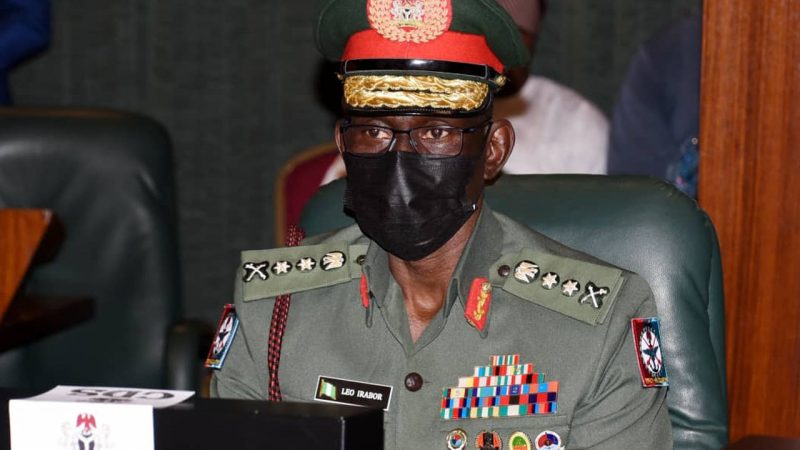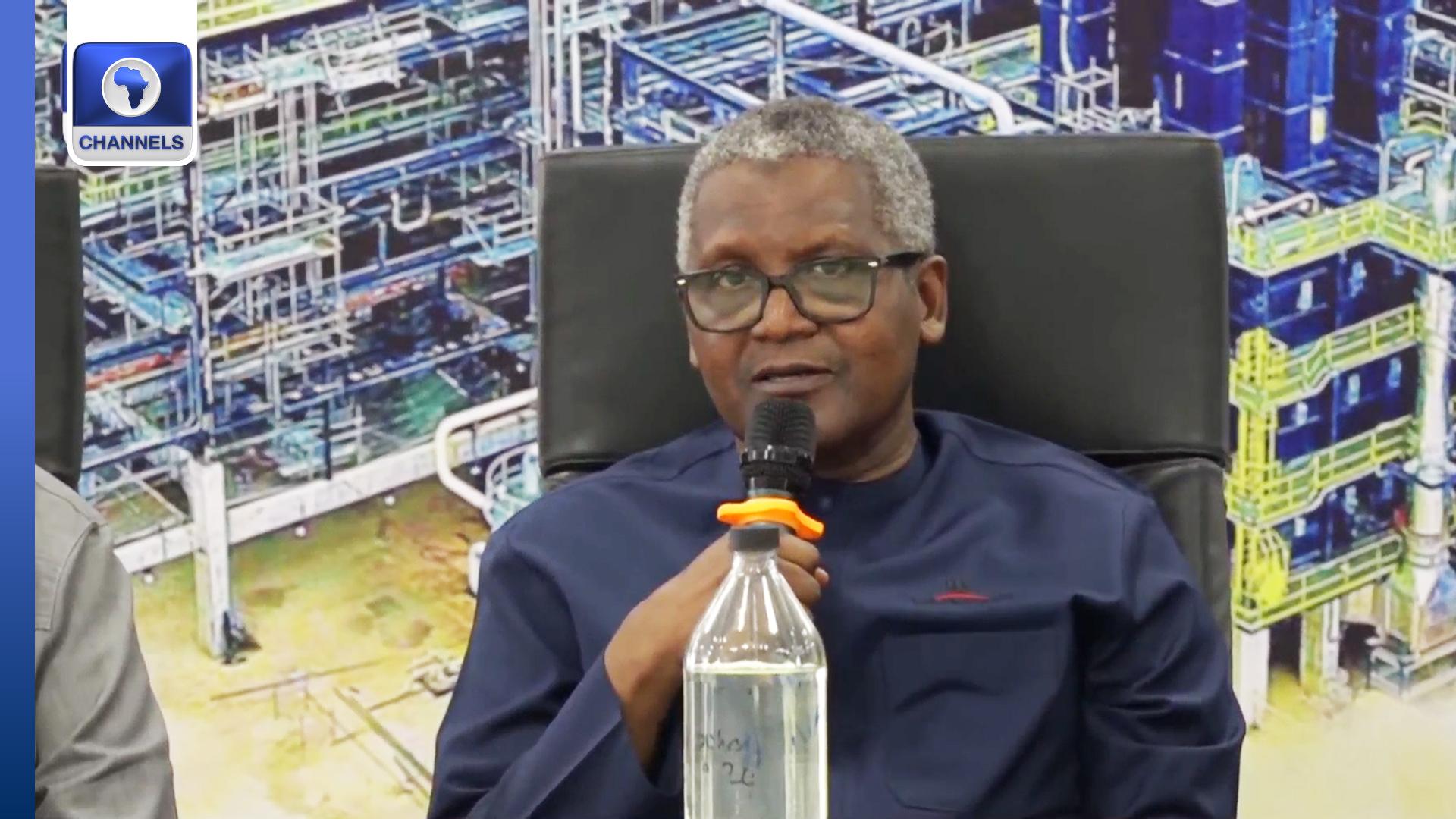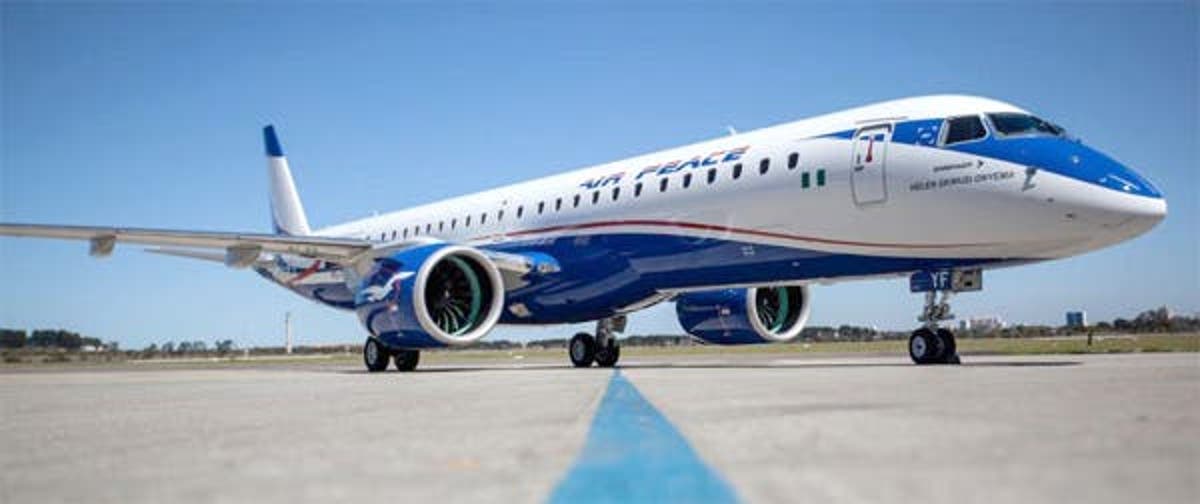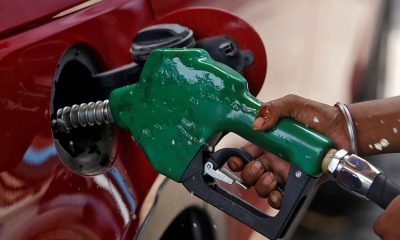Business
Chief of Defence Staff threatens action as petrol prices hit N400/litre

The Chief of Defence Staff (CDS), Gen. Lucky Irabor, yesterday threatened that the Federal Government would not fail to activate alternative actions should the marketers of petroleum product fail to end the prolonged fuel scarcity.
“We do have 24-day sufficiency for AGO (diesel) and the aviation we have 45 days of stuffiness for ATK aviation fuel,” he said.
He added that there is fuel in every depot and evacuation was ongoing.
The NNPC boss noted that petrol smuggling was on the rise as over 67million litres of petrol has been evacuated daily but the crisis has prevailed.
READ ALSO:
- 2023: Why Wike, allies can’t publicly declare support for Tinubu or Peter Obi
- Housewife, son jailed for beating in-law to death over meat
- Hitmen group arrested, jailed after trying to subcontract assassination job to one another
“We have evidence now and we’re following this through that some of our customers are actually taking products to other countries. And we’ll get to the root of this. And the appropriate government security agencies will deal with this,” Kyari said.
The NNPC head also blamed the marketers, saying they did not follow the official petrol price rate at the depots and increased prices arbitrarily as some depots sell from N172 to N260/l above the agreed price, saying the marketers could not buy at that rate and sell at official rate.
“We have challenged IPMAN to bring documents on depots selling at N260 to them, but no one will bring a record,’’ he added.
The Chief Executive, Nigerian Midstream and Downstream Petroleum Regulatory Authority (NMDPRA), Farouk Ahmed, confirmed there were several pacts with the marketers and transporters but such deals had not been followed through.
“But again, the more we agree, the more you lift the lever. We cannot continue like that,” he said.
He said recently NMDPRA sanctioned seven depots as deterrents but that did not work.
He urged marketers to help provide names of depots selling above ex-depot price but they refused.
CDS Irabor said: “It’s a crisis of internal nature which security and Police should lead but if it gets above that, there is an alternative.
“If there is no solution, let me reiterate that the government is not handicapped and there is an alternative and we pray that we don’t get to the level where the alternative will be activated,” Irabor said.
The Inspector General of Police Usman Alkali Baba, said the problem is in distribution, and urged operators for increased monitoring of the process.
“I think it is our role to assist the NNPC in monitoring the process of distribution if that will help us leverage the problem.”
Chairman of the Major Oil Marketers Association of Nigeria (MoMAN) Adetunji Oyebanji, said there are other costs that operators incur outside the ex-depot price. As he urged members to work to ensure products are supplied at the official rate.
Chairman of the Depot and Petroleum Products Marketers Association of Nigeria (DAPPMAN), Mrs Winifred Akpani, said the depot owners met last week on how to solve the price problem and distribution too.
She urged NNPC to only deliver products to depots (members) that will supply the right way, alleging that DAPPMAN does not regulate depot owners who are non-members.
READ ALSO:
- 2023: Either Obi or Kwankwaso may ‘Step down’ for me – Atiku
- Nigeria ranks 150 out of 180 countries in 2022 Transparency International Corruption Index
- $1bn investment recorded in auto industry – Minister
“We have all determined to ensure that we can help where we can help,” adding that profiteering is causing many problems to the country.
NARTO president, Yusuf Othman, lamented the increase in freight rate due to market reality saying officially it is N42 per kilometre but in reality it’s over N50 and so truckers give preference to marketers that pay cash and the market rate.
He decried the rising cost of buying trucks which he now said is over N60m as well as rising diesel cost of N880/l.
He noted that only major marketers pay twice for freight and that only OVH/NNPC give diesel at rebate, others do not.
According to Nigeria Union of Petroleum and Natural Gas Workers (NUPENG), President, Comrade Williams Akporeha, said marketers have no right to increase the price because petrol is subsidized.
“Our position at NUPENG is that any depot or filling station that sells above the price must have the wrath of Nigerians to face,” he said.
The price of petrol across the country averaged between N380 and N400 per litre yesterday as the scarcity of the product assumed a disturbing dimension, nearly grinding economic activities.
Our correspondent who monitored some petrol stations in Aba, the commercial nerve of Abia state reports that most major marketers were out of stock of the product.
A visit to MRS filing by Asa road and among others revealed that they dispensed their PMS to customers at N400 per liter.
Commercial bus and tricycle operators operating within Umuahia capital city and Aba have since increased their fares with N50, N100 or more depending on the distance.
In Osun State, petrol was sold for N400, N370 and N365 per liter.
Although there is no long queues at the petrol stations selling at these prices, there are still are still long queues in other stations where it is sold for cheaper rates.
READ ALSO:
- Face-off between Niger Gov, Senator disrupts pro-Tinubu rally in Borgu
- Emefiele wants to cause uprising to have Interim Govt – Fani-Kayode
- Muslim leaders protest alleged rape of woman in Niqob (purdah) inside mosque in Ibadan
Long queues still surfaces at Bovas, NNPC, Matrix, NIPCO among others in the city.
Residents of Makurdi, Benue State capital and its environs are passing through hell to buy petrol too.
Yesterday, petrol was sold at #355 per litre in all the Independent marketers filing stations in Makurdi.
Getting the products was difficult as motorist remained on long queue for hours lamenting in frustration
The situation remained same in Adamawa State.
Car owners and commercial vehicle operators queued up in the few filling stations dispensing fuel where prices ranged at between N370 and N390 per litre within the state capital, Yola, and as much as N500 per litre in rural communities in the southern and northern tips of the state.
The whole of Yola had just one NNPC mega station selling fuel at the ‘sane’ price of N199 per litre yesterday, but the queue is usually so long that only people with the luxury of servants or unattached staff could send such persons, usually to buy large volumes of the commodity.
In Kaduna State, scarcity of petrol persisted in Kaduna, as price of the product reached N625 in the black market.
Also, our correspondents observed that, few major and independent petrol stations dispensing petrol for N210 per litre, had unprecedented queue, while filing stations on the outskirts of the metropolis, especially on Kaduna-Zaria highway, Kaduna-Abuja and Kaduna-Kachia roads, were selling for between N350 to N380 per litre.
The Nigeria Midstream and Down Stream Petroleum Regulatory Authority (NMDPRA) said it has intensified routine patrol and monitoring of servicing stations to enhance steady fuel supply in Adamawa.
While going round some of the filling stations in Yola , it was observed that a team of officials led by the State Coordinator of the Regulatory Agency directed all filling stations which had products to begin selling to consumers or risked being sanctioned.
In Edo State, Godwin Obaseki led administration promised quick end to the scarcity and hike in the price of Premium Motor Spirit (PMS), thereby receiving 780,000 litres of petrol.
It also set up of a task force to monitor the distribution and sale of petrol in filling stations across the 18 local government areas of the Southsouth state.
Edo Commissioner for Mining and Energy, Ethan Uzamere, an engineer, who was accompanied by his counterpart in the Ministry of Communication and Orientation, Chris Nehikhare, and the Special Adviser to Obaseki on Media Projects, Crusoe Osagie, made the disclosure yesterday afternoon in Benin at a news conference.
The news conference took place after the meeting between the representatives of Edo government and leaders of the protesting Civil Society Organisations (CSOs) in the state.
Uzamere revealed that the supplied product (780,000 litres) would be distributed among the major and independent marketers of petroleum products in Edo’s three senatorial districts.
READ ALSO:
- Consumers challenge Ikeja Electric over threat to withdraw prepaid meters
- No Justification for current petrol scarcity – PENGASSAN
- Stop rejecting old naira notes, NURTW tells members
He stated that Edo government would monitor the sale of petrol in the state, in order to ensure that members of the public were not exploited by the owners of the various filling stations.
The commissioner for mining and energy in Edo disclosed that members of the petroleum monitoring task force would be unveiled later yesterday evening, while assuring that all efforts would be put in place to ensure that no product supplied to the state was diverted.
He said: “Edo government has heard the cries of the residents of the state on the issue of fuel scarcity in Edo. The state government is working to ensure the availability of the product.
“As part of the measures, Edo government has set up a task force to monitor the situation, and ensure that no resident of the state is exploited. We also wish to announce that already, the state has received 780,000 litres of petrol, which will be distributed to major and independent marketers.
“The task force, whose members will be announced before the close of work today (Tuesday), will monitor the distribution and sale of petroleum products in Edo State.”
Nehikhare, in his remarks, gave an assurance that the welfare of the residents of Edo was very crucial, and being taken seriously by the state government.
Edo commissioner for communication and orientation also hailed leaders of CSOs for the maturity displayed in handling the protest that erupted on Monday, over petrol scarcity and price hike, while assuring that Obaseki’s administration would continue to engage all the major stakeholders, in order to find a lasting solution to the fuel challenge.
Osagie, while also speaking, noted that part of the duties of the task force’s members would be to monitor prices of petroleum products in Edo, while warn the marketers against arbitrary increase in the prices of the products,.declaring that anyone caught would be severely punished according to the dictates of the law.
The Nation
Business
I’m honoured, excited over World Bank’s appointment – Dangote

I’m honoured, excited over World Bank’s appointment – Dangote
President and CEO of Dangote Group, Aliko Dangote, has expressed gratitude following his appointment to the World Bank’s Private Sector Investment Lab, a global initiative aimed at accelerating private investment and job creation in emerging economies.
In a statement confirming the development, Dangote described the appointment as both an honour and a reflection of his long-standing commitment to economic development through private enterprise.
“I am both honoured and excited to accept my appointment to the World Bank’s Private Sector Investment Lab, dedicated to advancing investment and employment in emerging economies,” Dangote said.
“This opportunity aligns with my long-standing commitment to sustainable development and unlocking the potential of developing economies.”
He referenced the successes of the so-called Asian Tigers, economies that experienced rapid growth through strategic investment, as a source of inspiration for advancing similar outcomes in other parts of the world.
The World Bank announced Dangote’s inclusion on Wednesday as part of a broader expansion of the Lab, which enters a new phase focused on scaling up solutions that attract private capital and generate employment in developing countries.
Other newly appointed members include Bill Anderson, CEO of Bayer AG; Sunil Bharti Mittal, Chairman of Bharti Enterprises; and Mark Hoplamazian, President and CEO of Hyatt Hotels Corporation.
READ ALSO:
- Akpabio to represent Tinubu at Pope Francis funeral
- PDP will come out stronger, Saraki reacts to Okowa, Delta gov defection
- Countries eligible to enter US without visas for 90days (full list)
World Bank Group President Ajay Banga noted that the expanded membership underscores the institution’s focus on integrating private-sector leadership into its strategy for global job creation.
“With the expanded membership, we are mainstreaming this work across our operations and tying it directly to the jobs agenda that is driving our strategy,” Banga said.
“This isn’t about altruism—it’s about helping the private sector see a path to investments that will deliver returns, and lift people and economies alike. It’s central to our mandate.”
The lab, which was co-chaired in 2023 by Canadian Prime Minister Mark Carney, previously sought to mobilise £1 trillion in sustainable investment, particularly targeting energy transition projects in emerging markets.
Aviation
Air Peace suspends flights nationwide over NiMet strike

Air Peace suspends flights nationwide over NiMet strike
Air Peace has suspended all its flight operations across the country due to the ongoing strike by the Nigerian Meteorological Agency (NiMet).
The airline said in a statement on Wednesday that it was also suspending operations due to the unavailability of QNH (hazardous weather) reports required for safe landings.
“Due to the ongoing NiMet strike and the unavailability of QNH (hazardous weather) reports required for safe landings, Air Peace has suspended all flight operations nationwide until the strike is over,” Air Peace said.
“Your safety is our top priority. We appreciate your understanding and will share updates as the situation unfolds.”
The airline had earlier announced that the NiMet strike could lead to flight delays and cancellations across its network.
Air Peace added that it was monitoring the situation and working with relevant stakeholders to minimise the impact on customers’ travel plans.
Employees of NiMet commenced a nationwide indefinite strike over welfare issues on Wednesday.
Some of the issues raised involve “NiMet’s refusal to negotiate or implement agreed financial allowances and unresolved entitlements,” including wage awards, peculiar allowances, and outstanding payments from the 2019 minimum wage.
They also accused the management of the agency of withholding important documents, ignoring requests for inclusion of omitted staff in past payments, and neglecting key training programmes in favour of executive retreats.
Business
Nigeria’s gas production increases by 15.6% to 227,931.65 mscf

Nigeria’s gas production increases by 15.6% to 227,931.65 mscf
Nigeria’s gas output has increased 15,6 percent month-on-month, MoM, to 227,931.65 million standard cubic feet, mscf, in March 2025.
But on year-on-year, YoY basis, the nation’s gas output recorded a marginal increase to 227,931.65 mscf in March 2025, from 198,353.62 mscf, recorded in the corresponding period of 2024.
Data obtained from the Nigerian Upstream Petroleum Regulatory Commission, NUPRC, Gas Production Status reports indicated that of the total of 227,931.65 mscf produced in March 2025, 119,552.75 mscf was associated while 108,378.90 mscf was non-associated gas.
Associated gas is extracted in the process of producing crude oil while non-associated gas is produced without crude oil after much investment, exploration and development.
The Ministry of Petroleum Resources (Gas), which is directly involved in the development of policies, targeted at increasing investment in the sector said efforts have been made to increase investment and production of gas in Nigeria.
Similarly, in its recent report obtained by Vanguard, the Nigerian LNG Limited stated: “We are fully committed to expanding our operations with the NLNG Train 7 Project, which will boost our production capacity by 35%, increasing from 22 Million Tonnes Per Annum (mtpa) to 30 mtpa. This project underscores our role as a key player in the global LNG market and positions Nigeria as a top-tier supplier of LNG, leveraging its vast proven gas reserves of 202 trillion cubic feet (the 9th largest globally).
Vanguard
-

 metro24 hours ago
metro24 hours agoTruck falls from Lagos bridge on two buses
-

 metro18 hours ago
metro18 hours agoHow Access Bank staff secretly filmed 400 colleagues naked in office
-

 Education2 days ago
Education2 days agoJAMB officials seize candidates’ hijab at Caleb varsity, Muslim students kick
-

 metro2 days ago
metro2 days agoOmokri : How Tinubu’s political mastery started with Abiola, says El-Rufai, Obi’s forces can’t stop him
-

 International2 days ago
International2 days agoUS releases 41 countries granted 90-day entry without visas (full list)
-

 metro2 days ago
metro2 days agoGroom cancels wedding, marries another lady same date, venue
-

 metro19 hours ago
metro19 hours agoDSS arrests British Army Officer, others, seizes 57 AK47
-

 metro1 day ago
metro1 day agoEFCC declares four persons wanted over CBEX scam









